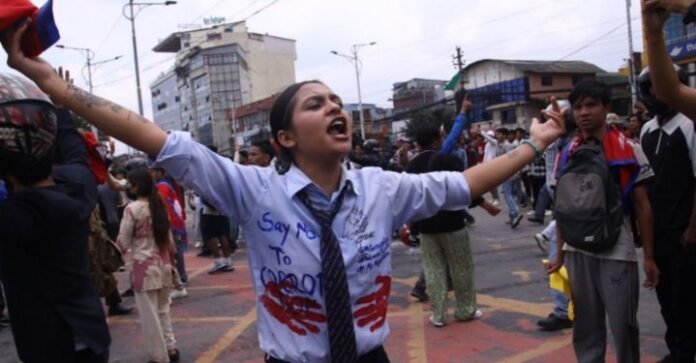On September 8, 2025, Nepal faced one of its most intense civil uprisings in recent history as Generation Z demonstrators—largely under the age of 28—clashed with authorities following the government’s decision to ban 26 major social media platforms. What began as a peaceful movement against digital censorship and systemic corruption quickly descended into chaos, leaving 19 dead and over 200 injured.
A Generation Interrupted
The Nepali government’s abrupt move to block access to platforms like Facebook, Instagram, WhatsApp, YouTube, X (formerly Twitter), and Reddit shook the digital foundations of Nepal’s youth. The Ministry of Communications justified the ban by stating that the platforms failed to comply with recent legislation requiring platform registration, local representation, and legal accountability.
However, for Gen Z, whose lives, careers, and activism are deeply integrated with the digital world, the ban felt like a targeted assault.
“This is more than just blocking apps. They’re silencing us,” said 22-year-old student Aashish Karki from Kathmandu. “We’re not just online for fun—we learn, earn, and speak out online.”
The Movement Erupts
Mobilized through offline word-of-mouth, text messaging, VPN workarounds, and the few remaining platforms like TikTok and Viber, youth across Kathmandu and other major cities organized under the informal banner of the “Gen Z Movement.”
Wearing school uniforms, face masks, and holding handmade placards, thousands took to the streets demanding:
- Restoration of digital rights
- An end to corruption and nepotism
- Accountability from elected officials
- Freedom of expression
Demonstrations began peacefully, but tensions escalated as protesters approached Parliament and key government buildings. Some tried to dismantle security barricades, leading to a swift and violent police response.
A Deadly Confrontation
Police deployed water cannons, tear gas, rubber bullets, and eventually live rounds in some locations to disperse the swelling crowds. Protesters retaliated by throwing stones, setting fire to barricades, and chanting slogans condemning political elites and corruption.
By the end of the day, 19 people had died, mostly in Kathmandu, with fatalities also reported in Itahari and Pokhara. Over 200 others sustained injuries, with some in critical condition.
Human rights organizations, including Amnesty International and the UN Human Rights Office, swiftly condemned the excessive use of force.
Resignation and Repercussions
In the aftermath of the violence, Home Minister Ramesh Lekhak resigned, acknowledging that the situation had been mismanaged. His resignation, however, did little to ease tensions on the ground.
Activists criticized the government’s slow response to the tragedy and called for:
- An independent investigation into the deaths
- Immediate restoration of banned platforms
- Political reform to address corruption
Political and Public Reaction
The political establishment was split in its response. Prime Minister K.P. Sharma Oli defended the social media ban as necessary for “national security and digital sovereignty.” In contrast, Mayor Balendra Shah of Kathmandu openly expressed solidarity with the youth, calling their movement “a wake-up call for a decaying system.”
The Rastriya Swatantra Party (RSP), known for its anti-establishment stance, also voiced full support for the Gen Z protests and warned the government not to suppress democratic expression.
What’s Fueling Gen Z’s Anger?
While the social media ban served as the immediate spark, the protests were underpinned by deeper frustrations:
- Widespread corruption and “Nepo baby” culture in politics and business
- Youth unemployment and lack of economic opportunity
- Institutional dysfunction in areas like education, infrastructure, and governance
- Disconnection between the aging political class and Nepal’s tech-savvy younger generation
A viral online trend mocking elite political offspring—dubbed #NepoKids—became symbolic of the resentment many young people feel toward entrenched privilege.
Censorship vs. Civil Liberties
The social media ban has reignited debates over the role of digital freedoms in democratic societies. For Nepal’s youth, social media is not just entertainment—it’s:
- A platform for job opportunities
- A space for political education
- A means to organize and protest
- A tool for holding power accountable
Blocking access was seen by many as an authoritarian overreach, prompting questions about Nepal’s trajectory as a democracy.
The Future of the Movement
Despite curfews and a heavy police presence, youth groups have vowed to continue their resistance. Protest organizers are now focusing on:
- Decentralized action in smaller towns
- Use of offline networks and international platforms
- Collaboration with civil society and human rights groups
If the government continues to stonewall, analysts fear the protests could evolve into a broader political crisis—perhaps even leading to early elections or a reshuffling of leadership.
A Nation at a Crossroads
Nepal, a nation with a long history of student activism and civil uprisings, finds itself once again at a pivotal moment. The Gen Z movement is different, however—digitally connected, globally aware, and unwilling to be silenced.
As the country mourns its dead and grapples with the largest youth-led uprising in over a decade, the question remains: Will Nepal’s leaders listen, or will this generation be forced to scream louder?

